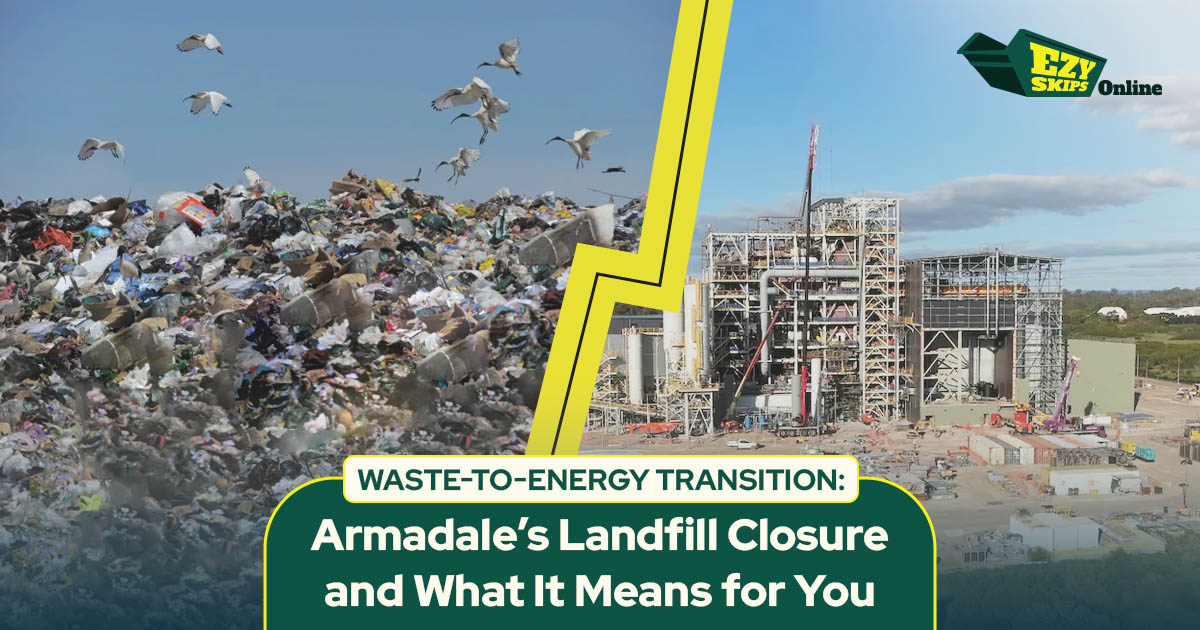
By the end of 2024, Armadale will close its landfill site, shifting to a new waste management approach that will see general waste redirected to the Avertas Waste-to-Energy (WTE) plant in Kwinana. This change aims to reduce harmful methane emissions and turn waste into energy, providing a more sustainable solution for waste disposal.
However, as Armadale moves away from traditional landfill disposal, it also faces new challenges. To ensure the community continues to manage waste effectively, several important solutions need to be put in place.
Why Close the Landfill?
The closure of the landfill is part of a broader effort to reduce greenhouse gas emissions. Landfills are a major source of methane, a potent greenhouse gas.
By sending waste to the Avertas WTE plant instead, the general waste will be converted into energy, which helps power the local grid. This move is an important step toward reducing Armadale’s environmental impact and finding more sustainable ways to manage waste.
The Challenges Ahead
While the move to waste-to-energy is a positive step, some challenges need addressing to make sure the system works for everyone in Armadale. One of the biggest concerns is the lack of a green food and garden waste (FOGO) bin, which would allow residents to dispose of organic waste like food scraps and garden trimmings.
Without a FOGO bin, many residents currently rely on sending organic waste to landfills, where it can cause methane emissions to rise. Additionally, there are concerns about recycling.
Without clear guidelines and education, recycling contamination can easily occur, meaning that recyclable materials end up in the wrong bins, reducing the effectiveness of recycling programs.
How to Address These Challenges
To ensure the transition away from landfill is successful, Armadale can implement several practical solutions:
1. Introducing a FOGO Program
One of the best ways to reduce organic waste going to landfills is by introducing a FOGO bin for residents. This would allow food scraps, garden waste, and other organic materials to be composted or recycled into energy.
Not only would this reduce methane emissions, but it would also help Armadale achieve better recycling and composting rates.
2. Better Recycling Education
Many residents may not know what can and can’t be recycled, which can lead to contamination in recycling bins. By launching educational campaigns and providing clear information on what goes into each bin, Armadale can improve its recycling rates.
Community workshops, online guides, and pamphlets can all play a role in teaching residents how to sort their waste correctly.
3. Encouraging Home Composting
Another way to reduce organic waste is by offering incentives for home composting. Providing subsidies or rebates for composting bins can encourage residents to compost their food scraps and garden waste at home.
This would help divert waste from the landfill and make waste management more sustainable at the household level.
4. Collaborating with Local Businesses
Armadale could partner with local businesses, such as cafes and markets, to create systems for collecting organic waste. These businesses often produce large amounts of food scraps that can be composted or turned into bioenergy.
By working together, Armadale can build a more circular waste management system that benefits both residents and businesses.
5. Regular Waste Audits
Conducting regular audits of residential waste can help identify trends and areas where waste management can be improved. By understanding what’s going into the bins, the city can adjust its strategies to improve recycling rates and reduce waste contamination.
This data-driven approach can ensure the waste management system is as effective as possible.
6. Supporting a Circular Economy
Finally, adopting a circular economy strategy can help Armadale reduce waste and encourage more sustainable practices. This means promoting the reuse and recycling of materials and reducing the overall amount of waste generated.
By implementing policies that support recycling initiatives and material recovery, Armadale can work toward creating a more sustainable future for everyone.
The Way Forward for Armadale
As Armadale moves away from landfill disposal and towards waste-to-energy, it’s clear that the community will need to adapt. The introduction of a FOGO bin, improved recycling education, and home composting incentives are all key steps in ensuring the city’s waste management system remains effective and sustainable.
By embracing these solutions, Armadale can continue to reduce its environmental footprint while meeting the needs of its residents. With services like skip bin hire Armadale WA with Ezyskips Online, the city has a great opportunity to lead the way in sustainable waste management across Western Australia.
With the right programs and community involvement, the city can set an example for other regions facing similar challenges in waste management and environmental sustainability. For more information about the waste-to-energy transition and to get involved in local recycling programs check out the City of Armadale’s website, or to organise skip bin hire, contact us today.

